
Between simmering inflation, rising interest rates, the ongoing war in Ukraine, and wider geopolitical tensions, businesses have plenty to worry about this year. In fact, a recent survey by EY-Parthenon showed that CEOs are keeping their eye trained on multiple risk factors, nearly all of equal importance.
About a third of the CEOs surveyed cited uncertain monetary policy and the continuation or return of pandemic-related disruptions as the greatest risk to business growth. But almost an equal number named inflation, restrictive regulatory environments in key markets, geopolitical tensions, or cybersecurity risks as their organization’s top liability.
With so many competing concerns, captaining a company can get overwhelming, so here are five charts that can sharpen your focus on the macroeconomic climate for the coming year, all based on research from the strategy experts at EY-Parthenon.
High inflation isn’t going away
Though inflation has started to come down for consumers, it hasn’t for the corporate UK. Consumer price inflation tends to hog headlines, but producer price inflation (PPI), which measures the cost of goods bought and sold by UK manufacturers, is a crucial concern for companies and typically much more volatile.
While CPI peaked at 11.1% in October 2022, PPI maxed out at 24.6% in June of last year. EY-Parthenon forecasts that PPI will stay high, between 10% to 13% through the end of 2023. That means that between 2020 and 2023, PPI inflation will have risen by nearly 50%. That’s a big step up from what’s been considered “normal”; for context, PPI rose by just 7% between 2016 to 2019.
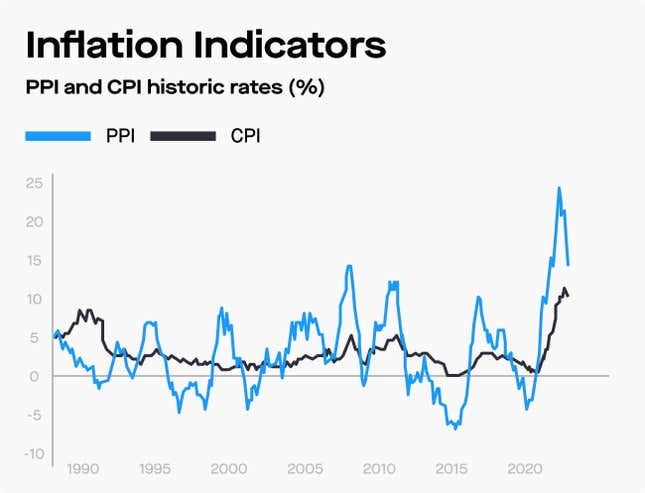
There are a few factors keeping inflation high. China’s re-opening stoked an increase in demand for various goods. Meanwhile, geopolitical shocks are driving up gas, commodity, and food prices. These macroeconomic forces will be reverberating for the foreseeable future, and businesses must find ways to deal with higher prices to survive.
More companies are succumbing to financial stress
Signs of financial stress are mushrooming, with an increasing number of companies issuing multiple profit warnings. While retailers continue to lead in profit warnings, tension from continued cost pressure, tighter credit, and declining consumer confidence has spread to other sectors. By the end of 2022, it was clear that almost no industry was immune, as profit warnings appeared across the economy.
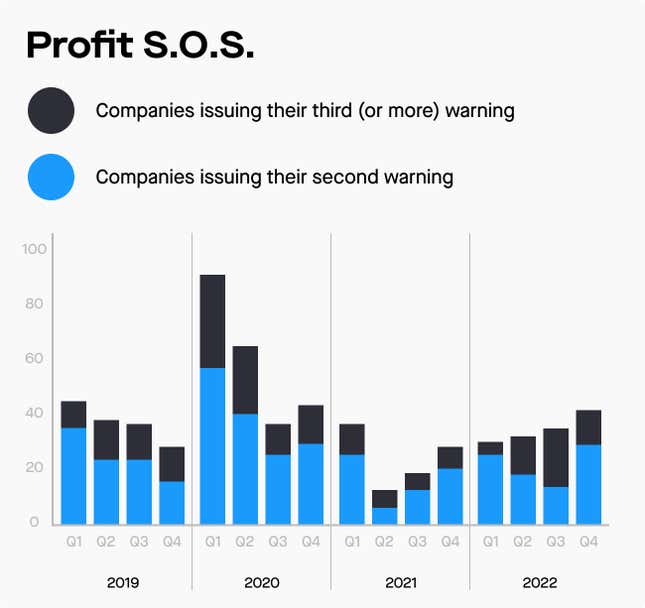
Financial anxiety is currently more concentrated among the UK’s small suppliers and contractors; 72% of warnings came from companies with less than £200m in turnover in the fourth quarter. Past downturns have shown that this distress can quickly spread up the value chain, especially when access to capital gets squeezed. To avoid more profit warnings, executives need to act quickly to adjust to this new, more volatile macro outlook.
Leaders should expect to see more labor disruption
Inflation can have a big psychological effect. The cash crunch caused by inflation, coinciding with a hot labor market, is fueling demands for wage increases. Private sector wage growth in the UK increased by 7.2% between March and May 2022, while the public sector saw wage growth of just 1.5%. But in both camps, pay fell in real terms.
With many unions now demanding pay increases as high as 30%, EY-Parthenon calculates that the UK could be on course for the most days lost to strikes since 1990.
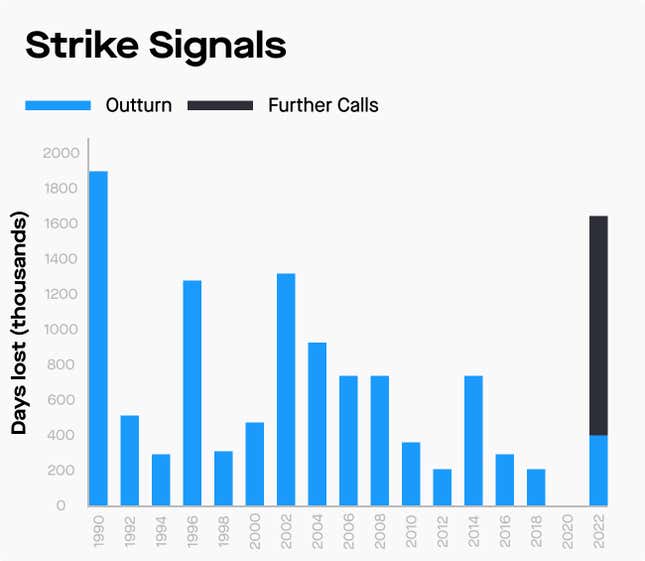
The EU is also on track to see inflation-related labor disruption. Some 120 million EU workers have collective bargaining protections in place, and continued high inflation could trigger negotiating en masse.
The M&A market will stay busy even in a downturn
With nearly 90% of executives expecting to oversee some kind of transaction this year, the M&A market will be more active than it usually is during a slowdown. Nearly half of leaders EY-Parthenon surveyed said they’re looking to buy assets, while a third want to divest. More than half are looking to enter into some kind of joint venture or alliance.
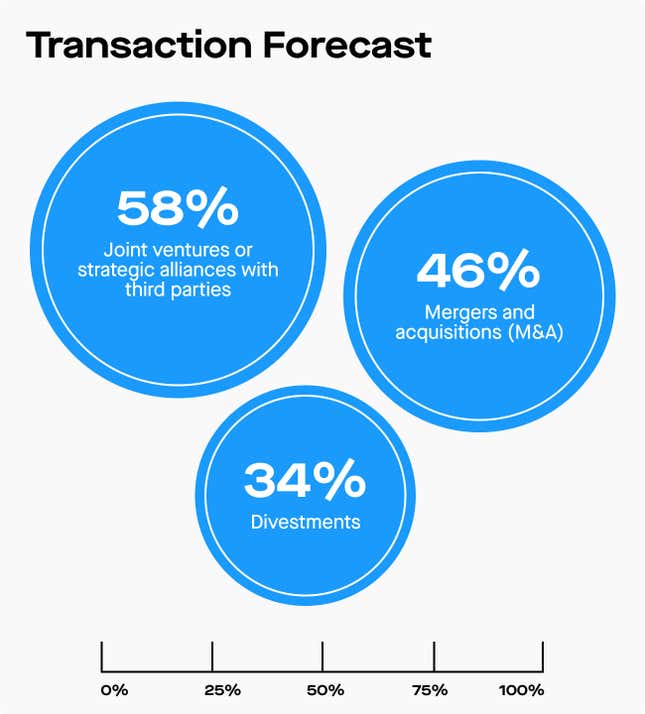
Interestingly, labor trends play a big role in driving M&A. Access to new talent is a key driver for many CEOs eyeing acquisition. Another standout characteristic: geopolitical flareups that are redrawing global ambitions.
Nearly four out of five CEOs surveyed said they are looking to conduct M&A in countries that are geopolitically and economically aligned with their home country. By contrast, fewer than 1 in 10 CEOs said they would consider acquiring in a market that isn’t aligned.
Rampant consumerism is on the decline
The pandemic had a big impact on values and ideals. Vaccinations and boosters have enabled a return to “normal,” but consumers have moved away from rampant spending to embrace a more conscious consumption. According to an EY-Parthenon study, concern for the planet figures just as much as affordability in buying decisions now — as least for UK consumers. Cost is still important, but it’s no longer the top concern.
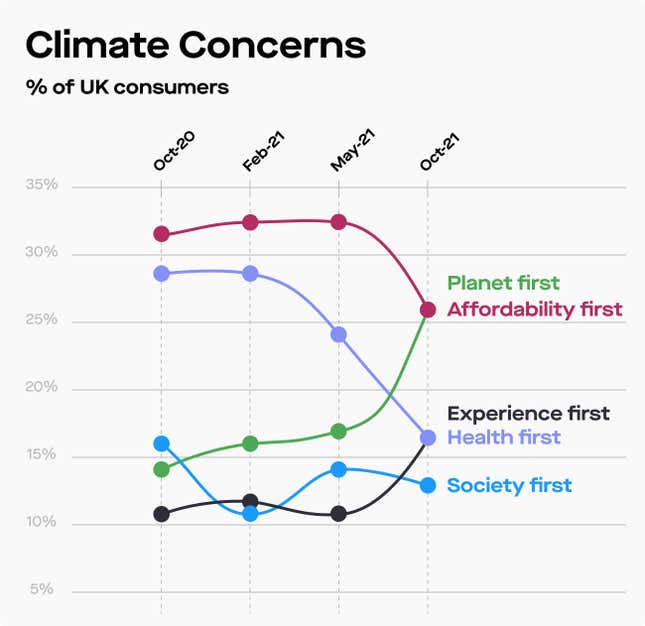
This shift in sentiment signals a pivot away from the throwaway culture that’s defined consumer behavior for decades. UK consumers expect to buy better quality items that last, and some are willing to pay a premium for them.
Almost half of shoppers surveyed said they are more likely to repair things than replace them, while more than half reported that a company’s behavior is just as important as what it sells.
The last three years have been tumultuous, and looking at the data, it’s clear that more turmoil is on the horizon. More than ever, company leaders need to stay abreast of global economic trends that can make or break an individual business.
Learn more about how EY-Parthenon can help your company navigate the new challenges ahead.
This content was produced on behalf of EY-Parthenon by Quartz Creative and not by the Quartz editorial staff. Sources are provided for informational and reference purposes only. They are not an endorsement of EY-Parthenon or EY-Parthenon’s products or services. This publication contains information in summary form and is therefore intended for general guidance only. It is not intended to be a substitute for detailed research or the exercise of professional judgment. EY-Parthenon is a brand under which a number of EY member firms across the globe provide strategy consulting services. Member firms of the global EY organization cannot accept responsibility for loss to any person relying on this article.